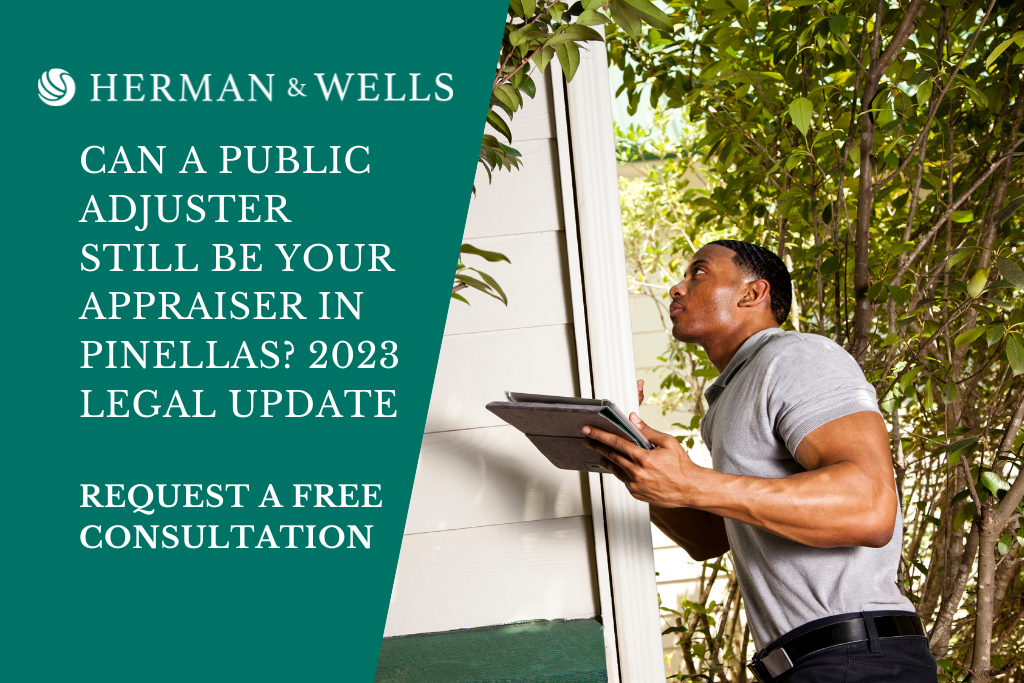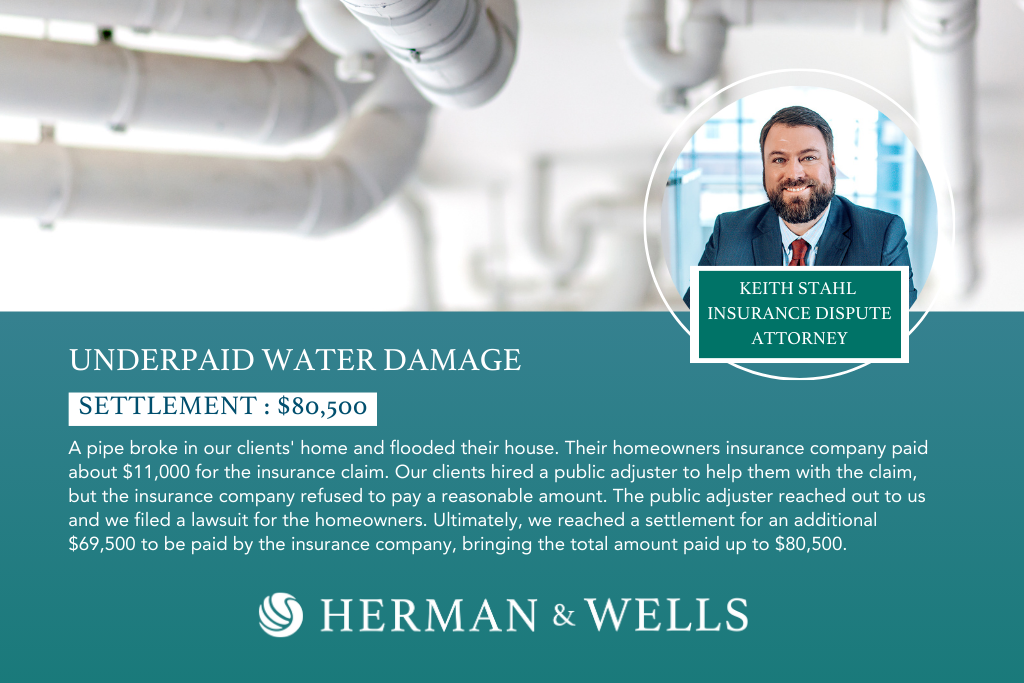In light of the recent Florida Supreme Court ruling, residents of Pinellas are left with pressing concerns regarding the role of a public adjuster in appraisals. This 2023 law update is critical, impacting how claims are handled and the rights you have when dealing with insurance companies. We’re here to bring clarity to these complexities, dissecting the implications of the ruling, and offering actionable advice.
For personalized guidance tailored to your situation, we strongly recommend reaching out to Herman & Wells to schedule a consultation with one of our experienced insurance lawyers. Let us help you navigate these changes with confidence and protect your legal rights!

The Cliff Notes: Key Takeaways From This Post
- 1Public adjusters are still allowed to assess damage in property claims, but they cannot act as appraisers if their fees exceed statutory limits.
- 2This ruling is seen as a way of increasing the transparency and fairness of the claims process by mitigating conflicts of interest between public adjusters and appraisers.
- 3This new regulation may be financially burdensome to some Pinellas residents, as they may have to hire separate professionals for adjusting and appraising services.
- 4To ensure their interests are adequately represented, Pinellas homeowners should seek professional legal guidance from experienced insurance lawyers who understand the latest rulings in the Florida Supreme Court.
- 5It’s important to stay informed about developments in insurance claims, as this could save you a significant amount of money and stress in the long run.
- 6Talk to the attorneys at Herman & Wells if you’re seeking a complete understanding of your rights and if you want to maximize the value of your claim!
The Role of Public Adjusters as Appraisers Before the Supreme Court Ruling
Public adjusters play an important role in helping homeowners file claims for property damage and evaluating the extent of damage due to natural disasters. In Pinellas County, they are often called upon to assist with appraisals for residential and commercial properties.
Advantages and Disadvantages of Having a Public Adjuster as an Appraiser
Benefits:
- Expertise: Public adjusters have comprehensive knowledge and understanding of insurance policies, enabling them to accurately assess and quantify property damage. Their expertise can be crucial in maximizing your payout.
- Advocacy: Unlike insurance company adjusters who work for the insurer, public adjusters work for you. Their job is to protect your interests and ensure you get the compensation you deserve.
- Time-saving: Dealing with insurance claims can be time-consuming and stressful. Employing a public adjuster allows you to focus on recovery while they handle the complex claim process
Drawbacks:
- Cost: Public adjusters charge a fee for their services, typically a percentage of your claim settlement. This cost can be significant, especially for high-value claims.
- Potential for Conflicts of Interest: While most public adjusters operate with the highest levels of integrity, there is the potential for conflicts of interest, particularly when acting as appraisers.
- Regulatory Hurdles: Recent changes in Florida law, specifically in Pinellas County, have placed certain limitations on the roles that public adjusters can perform, potentially affecting their ability to serve as appraisers.
The Recent Florida Supreme Court Ruling
Currently, public adjusters cannot serve as appraisers on an insurance claim. The case that catalyzed this ruling was “Monarch Claims Consultants vs. Fleming and Universal Property & Casualty Insurance.” The dispute arose when Monarch, a public adjuster, sought to also serve as the appraiser for a claim they were handling. This dual role came into question when their total fees exceeded the statutory cap, triggering an investigation and subsequent court trial.
The Florida Supreme Court, referencing a similar decision from a 2018 appeals court case, ruled against Monarch’s dual role. The court clarified that while public adjusters can still assist in filing claims and evaluating damage, they are prohibited from serving as appraisers in the same claim if their total fees surpass the statutory limit. This ruling is seen as a significant step in curbing certain tactics employed by some public adjusters in Florida, particularly in Pinellas County.
Implications of the Supreme Court Ruling for Insurance Carriers in Pinellas
The immediate impact of this ruling on Pinellas residents is likely to be a shift in how they approach property damage claims. Previously, the convenience of hiring a public adjuster who could also double as an appraiser was an attractive option for many homeowners. However, with this new restriction in place, residents will need to rethink their strategies and potentially hire separate entities for adjusting and appraising services.
In the long run, this ruling could bring about more transparency in the claims process. By separating the roles of public adjusters and appraisers, it mitigates the risk of a conflict of interest where an adjuster might inflate the appraisal to secure a larger fee. Hence, homeowners could be reassured that their appraisals are being conducted impartially.
However, this change is not without its challenges. For some Pinellas residents, particularly those with limited resources, hiring separate professionals for adjusting and appraising services could be financially burdensome. Moreover, navigating the already complex claims process becomes even more daunting with additional parties involved.
On the positive side, the ruling might also encourage competition within the industry, leading to better service quality. With public adjusters no longer able to monopolize both roles, Pinellas residents may benefit from a wider range of options when seeking appraising services. Ultimately, while this ruling ushers in a significant change, it has the potential to yield benefits in the form of transparency, fairness, and choice for Pinellas residents.
Step-by-Step Guide for Pinellas Residents
Step 1: Understanding the New Ruling
The first step is to gain a thorough understanding of the new ruling and how it impacts the process of filing property damage claims. This involves familiarizing yourself with the changes in the roles and responsibilities of public adjusters and appraisers.
Step 2: Strategize Your Approach
Given the new ruling, it’s critical to strategize your approach toward property damage claims. This might involve seeking separate professionals for adjusting and appraising services. Weigh the pros and cons of this new approach and decide what’s best for your specific situation.
Step 3: Seek Professional Legal Guidance
The complexities involved in the claims process, especially with the recent changes in the law, necessitate professional legal guidance. A well-versed attorney can help you navigate these changes, ensure your rights are protected, and assist in maximizing your claim’s value.
Step 4: Choose Your Professionals Wisely
Take the time to research and choose the professionals to handle your claim. This includes both the public adjuster who will evaluate your damage and the appraiser who will determine the property value. Make sure they have a good reputation, are experienced, and understand the particularities of Pinellas County and the latest Florida Supreme Court ruling.
Step 5: Stay Vigilant and Informed
Staying vigilant and informed throughout the claims process is crucial. Keep an open line of communication with your adjuster, appraiser, and attorney, ask for regular updates, and make sure you comprehend every step being taken.
The new Florida Supreme Court ruling has certainly altered the claims landscape in Pinellas, making it even more vital for residents to seek professional legal guidance. Legal professionals will not only aid in navigating the intricate claims process but also ensure that your interests are adequately represented. It’s an investment that could save you significant money and stress in the long run.
Why Pinellas Homeowners Should Talk to an Insurance Lawyer
In conclusion, as the landscape of property insurance claims continues to evolve in Pinellas, Florida, staying abreast of these legal changes is paramount. This recent Florida Supreme Court ruling underscores the complexity of the claims process and reinforces the importance of professional guidance. Navigating such intricate legal terrains without seasoned professionals can be daunting and may lead to unfavorable outcomes.
We strongly encourage you to consult with one of our skilled insurance lawyers who is well-versed in the latest rulings and dedicated to protecting your interests. Reach out to Herman & Wells today for a comprehensive understanding of your rights and to ensure you secure the maximum value for your insurance claim! Call (727) 821-3195 to schedule a free consultation today!






